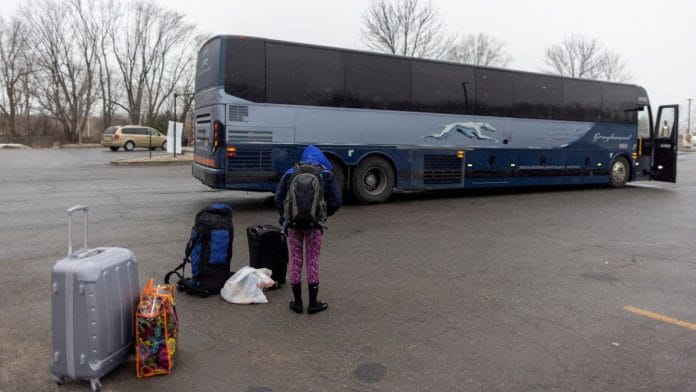New Delhi: Two men are on trial in the U.S. state of Minnesota on charges of human trafficking, nearly three years after the discovery of the bodies of four Gujarati Indians—Jagdish Patel, his wife, and their two children—at the U.S.-Canada border on 19 January 2022. The family froze to death while trying to cross into the U.S. from Canada on foot.
Now, Harshkumar Ramanlal Patel and Steve Shand are facing charges of human trafficking, criminal conspiracy and culpable homicide not amounting to murder in the U.S. federal court for allegedly running an international trafficking racket that preyed on the aspirations of families, such as the Patels.
U.S. prosecutors have accused Harshkumar Patel, a 29-year-old Indian living illegally in the U.S., of orchestrating the operation of trafficking Indian nationals across the U.S.-Canada border. Steve Shand, a 50-year-old resident of Florida, U.S., stands accused of participating in the operation as a driver. Both Patel and Shand are pleading not guilty.
According to the prosecutors, Harshkumar Ramanlal Patel, who goes by the ‘Dirty Harry’ alias, was denied a U.S. visa at least five times but remained in the U.S. illegally. He allegedly managed trafficking operations from a casino in Florida and coordinated with Shand on transportation logistics.
Court documents have shed light on conversations between the two men, such as Shand expressing concerns about the weather conditions on the night the Patel family died.
Shand texted Harshkumar Patel: “Make sure everyone is dressed for the blizzard conditions, please.” Patel responded with a simple “Done”. Another message from Shand on the extreme cold said, “(Are) They going to be alive when they get here?”
The trial of Patel and Shand, which started Monday, will likely last five days. It will delve into the global reach of their trafficking operation.
Also Read: Trump’s planning a war against illegal immigrants. Problem is, it was lost 70 years ago
Patel family’s fateful journey
On 19 January 2022, the Royal Canadian Mounted Police discovered the frozen bodies of Jagdish Patel, his wife Vaishaliben Patel, and their children, 11-year-old Vihangi and three-year-old Dharmik, near Canada’s Manitoba border, just 12 metres from U.S. territory.
Originally from the village of Dingucha in Gujarat, the Patels travelled to Canada on visitor visas before embarking on their ill-fated journey to the U.S. at the height of a fierce blizzard, with temperatures plunging to -35 degrees Celsius.
According to court documents, the family was part of a larger group attempting to cross into the US from Canada. Earlier in the day, U.S. Border Patrol agents intercepted Steve Shand and seven Indian nationals in Minnesota.
Shand, who was paid roughly $25,000 for five trips to transport Indian families, was arrested. He was in a van with two Indian nationals. Five other Indians were spotted walking towards his van. An individual in the group—suffering from severe cold-related injuries—required hospitalisation.
The group reported walking for 11 hours in subzero temperatures and, during the night, being separated from the Patel family. One individual was carrying a backpack filled with children’s clothes and toys, which spurred the search for the Patels, leading to the discovery of their bodies.
According to the BBC, investigations revealed that the Patels fell victim to a human trafficking racket with roots in Gujarat. Indian agents in Gujarat charged significant sums—up to $87,000 per person—for fraudulent student visas to Canada and subsequent illegal transport to the U.S. Once in the U.S., the migrants were forced to work in substandard conditions to repay their debts to the trafficking racket.
The Patel family’s connection to the racket was allegedly through a contact in Toronto—linked to a Gujarat-based organisation.
Implications
The tragedy of the Patel family put the increasing use of clandestine networks by undocumented migrants attempting to enter the U.S. under the spotlight.
The U.S. Border Patrol has recorded over 14,000 Indian nationals crossing the Canadian border illegally in the past year alone.
According to the Associated Press, the phenomenon is partly fuelled by promises of a better life in the U.S., where many migrants ultimately are exploited for cheap labour.
Jagdish and Vaishaliben Patel were educated professionals who had worked as teachers in India. Like many in their village, they dreamed of a better life in the U.S.
Their deaths, which Canadian Prime Minister Justin Trudeau, at the time, described as “mind-blowing”, underscored the dangers faced by those who embark on such perilous journeys to foreign lands.
The Patels’ story has become a cautionary tale about the risks of human trafficking and the exploitation of vulnerable migrants. It also highlights the need for stronger international collaborations to dismantle trafficking networks and protect vulnerable groups.
(Edited by Madhurita Goswami)
Also Read: Over 1,100 Indians repatriated by US in a year, flight to Punjab last week had over 100 passengers






